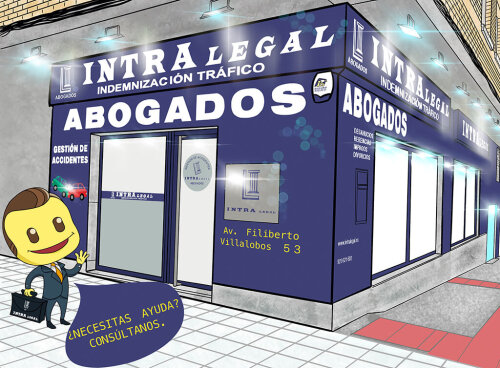Best Collaborative Law Lawyers in Salamanca
Share your needs with us, get contacted by law firms.
Free. Takes 2 min.
Free Guide to Hiring a Family Lawyer
List of the best lawyers in Salamanca, Spain
About Collaborative Law in Salamanca, Spain
Collaborative Law is an alternative dispute resolution process that enables parties to resolve legal conflicts in a cooperative, rather than adversarial, manner. In Salamanca, Spain, this approach is increasingly used in family law, civil matters, and some commercial disputes. It involves both parties working with specially trained collaborative lawyers and often other professionals, such as financial advisors or psychologists, to find mutually acceptable solutions outside of court. The process emphasizes open communication, transparency, and respect, aiming to minimize conflict and reach lasting agreements.
Why You May Need a Lawyer
People often seek help from collaborative lawyers in Salamanca when they wish to resolve disputes amicably without litigation. Common scenarios include divorce or separation, child custody and visitation arrangements, inheritance issues, business partnership dissolutions, and other interpersonal disputes. Collaborative Law is especially useful when maintaining a positive relationship between parties is important, such as parents who must co-parent after separation. Legal help is necessary to understand your rights, ensure agreements are fair, and manage the technical legal requirements. A lawyer with expertise in Collaborative Law in Salamanca can guide you through the process, safeguard your interests, and help draft binding agreements.
Local Laws Overview
In Salamanca, as in the rest of Spain, Collaborative Law is not a separate branch of law but a specific method for resolving disputes. The general legal framework applicable includes the Spanish Civil Code and regional adaptations concerning family and civil matters. While Collaborative Law agreements are private, their terms must comply with Spanish law and, in many cases, require judicial approval to become enforceable, particularly with matters affecting children and property. Spanish law encourages out-of-court settlements, and judges often look favorably on collaborative agreements that are considered fair and just. It is important to note that each party must be independently advised, and all parties must agree in writing not to initiate court proceedings during the process.
Frequently Asked Questions
What is Collaborative Law and how does it differ from mediation?
Collaborative Law involves each party having a lawyer trained in collaborative techniques who works together to reach an agreement, whereas mediation involves a neutral third party facilitating a resolution but not representing either side.
Can I use Collaborative Law for issues other than divorce?
Yes, Collaborative Law can be applied to various civil disputes, including inheritance, business dissolutions, and even some employment conflicts.
Are Collaborative Law agreements legally binding in Salamanca?
Agreements reached through Collaborative Law become legally binding when formalized in accordance with Spanish law, and, in many cases, must be approved by a judge to be enforceable.
What happens if the Collaborative Law process fails?
If the process does not result in an agreement, the parties may proceed to court, but the collaborative lawyers involved cannot then represent their clients in litigation.
Do both parties need to have lawyers in a collaborative process?
Yes, both parties are represented by their own trained collaborative lawyer to ensure the process is balanced and that each party receives proper legal advice.
Is Collaborative Law confidential?
Yes, discussions and documents shared in the collaborative process are confidential and normally cannot be used in court if the process breaks down.
How long does the Collaborative Law process take?
The duration varies depending on the complexity of the case, but it is typically faster than court proceedings, often taking a few months rather than years.
How much does Collaborative Law cost compared to litigation?
While costs depend on the length and complexity of negotiations, Collaborative Law is generally more cost-effective than going to court due to reduced legal proceedings.
Is Collaborative Law appropriate for cases involving domestic violence?
Collaborative Law is not recommended for cases where there is a significant imbalance of power or a history of domestic violence, as safety and fairness cannot be guaranteed.
What qualities should I look for in a collaborative lawyer in Salamanca?
Look for a lawyer with training and experience in collaborative processes, good communication skills, and a commitment to amicable resolution.
Additional Resources
For further support and information regarding Collaborative Law in Salamanca, consider the following resources:
- Ilustre Colegio de Abogados de Salamanca (Bar Association of Salamanca) - Provides lists of specialized collaborative lawyers.
- General Council of Spanish Lawyers - Offers general information on alternative dispute resolution methods.
- Spanish Association of Collaborative Law Professionals - Promotes best practices and training in collaborative law.
- Local mediation and dispute resolution centers in Salamanca, often offering complementary services.
- Official judicial and family courts in Salamanca for the validation and approval of collaborative agreements.
Next Steps
If you believe Collaborative Law may be right for your situation in Salamanca, Spain, consider the following steps:
- Assess whether your dispute is suitable for collaborative resolution, considering the need for ongoing relationships and willingness to negotiate.
- Seek an initial consultation with a collaborative lawyer to discuss your needs, legal options, and the collaborative process in detail.
- Ensure that the other party is open to the collaborative approach, as it requires mutual participation.
- Gather relevant documents and information that may be needed for the process, such as financial records or agreements.
- Remain open-minded and communicate openly, prioritizing cooperation and a willingness to reach fair agreements.
Keep in mind that a qualified collaborative lawyer in Salamanca will be able to guide you through each step and help you make informed decisions for your particular legal situation.
Lawzana helps you find the best lawyers and law firms in Salamanca through a curated and pre-screened list of qualified legal professionals. Our platform offers rankings and detailed profiles of attorneys and law firms, allowing you to compare based on practice areas, including Collaborative Law, experience, and client feedback.
Each profile includes a description of the firm's areas of practice, client reviews, team members and partners, year of establishment, spoken languages, office locations, contact information, social media presence, and any published articles or resources. Most firms on our platform speak English and are experienced in both local and international legal matters.
Get a quote from top-rated law firms in Salamanca, Spain — quickly, securely, and without unnecessary hassle.
Disclaimer:
The information provided on this page is for general informational purposes only and does not constitute legal advice. While we strive to ensure the accuracy and relevance of the content, legal information may change over time, and interpretations of the law can vary. You should always consult with a qualified legal professional for advice specific to your situation.
We disclaim all liability for actions taken or not taken based on the content of this page. If you believe any information is incorrect or outdated, please contact us, and we will review and update it where appropriate.














